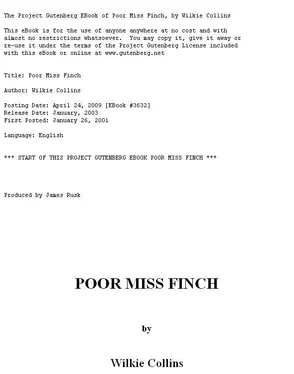Уилки Коллинз - Poor Miss Finch
Здесь есть возможность читать онлайн «Уилки Коллинз - Poor Miss Finch» весь текст электронной книги совершенно бесплатно (целиком полную версию без сокращений). В некоторых случаях можно слушать аудио, скачать через торрент в формате fb2 и присутствует краткое содержание. Год выпуска: 2002, Жанр: Классическая проза, на английском языке. Описание произведения, (предисловие) а так же отзывы посетителей доступны на портале библиотеки ЛибКат.
- Название:Poor Miss Finch
- Автор:
- Жанр:
- Год:2002
- ISBN:нет данных
- Рейтинг книги:3 / 5. Голосов: 1
-
Избранное:Добавить в избранное
- Отзывы:
-
Ваша оценка:
- 60
- 1
- 2
- 3
- 4
- 5
Poor Miss Finch: краткое содержание, описание и аннотация
Предлагаем к чтению аннотацию, описание, краткое содержание или предисловие (зависит от того, что написал сам автор книги «Poor Miss Finch»). Если вы не нашли необходимую информацию о книге — напишите в комментариях, мы постараемся отыскать её.
Poor Miss Finch — читать онлайн бесплатно полную книгу (весь текст) целиком
Ниже представлен текст книги, разбитый по страницам. Система сохранения места последней прочитанной страницы, позволяет с удобством читать онлайн бесплатно книгу «Poor Miss Finch», без необходимости каждый раз заново искать на чём Вы остановились. Поставьте закладку, и сможете в любой момент перейти на страницу, на которой закончили чтение.
Интервал:
Закладка:
On that date, I was composed enough to think again of Lucilla, and to remember Mrs. Finch's polite request to me that I would write to her from Marseilles.
I wrote briefly, telling the damp lady of the rectory (only at greater length) what I have told here. My main motive in doing this was, I confess, to obtain, through Mrs. Finch, some news of Lucilla. After posting the letter, I attended to another duty which I had neglected while my father was in danger of death. I went to the person to whom my lawyer had recommended me, to institute that search for Oscar which I had determined to set on foot when I left London. The person was connected with the police, in the capacity (as nearly as I can express it in English) of a sort of private superintendent—not officially recognized, but secretly trusted for all that.
When he heard of the time that had elapsed without any discovery of the slightest trace of the fugitive, he looked grave; and declared, honestly enough, that he doubted if he could reward my confidence in him by proving himself to be of the slightest service to me. Seeing, however, that I was earnestly bent on making some sort of effort, he put a last question to me in these terms:—"You have not described the gentleman yet. Is there, by lucky chance, anything remarkable in his personal appearance?"
"There is something very remarkable, sir," I answered. "Describe it exactly, ma'am, if you please."
I described Oscar's complexion. My excellent superintendent showed encouraging signs of interest as he listened. He was a most elegantly-dressed gentleman, with the gracious manners of a prince. It was quite a privilege to be allowed to talk to him.
"If the missing man has passed through France," he said, "with such a remarkable face as that, there is a fair chance of finding him. I will set preliminary inquiries going at the railway station, at the steam-packet office, and at the port. You shall hear the result to-morrow."
I went back to good Papa's bedside—satisfied, so far.
The next day, my superintendent honored me by a visit.
"Any news, sir?" I asked.
"News already, ma'am. The clerk at the steam-packet office perfectly well remembers selling a ticket to a stranger with a terrible blue face. Unhappily, his memory is not equally good, as to other matters. He cannot accurately call to mind, either the name of the stranger, or the place for which the stranger embarked. We know that he must either have gone to some port in Italy, or to some port in the East. And, thus far, we know no more.
"What are we to do next?" I inquired.
"I propose—with your permission—sending personal descriptions of the gentleman, by telegraph, to the different ports in Italy first. If nothing is heard of him in reply, we will try the ports in the East next. That is the course which I have the honor of submitting to your consideration. Do you approve of it?"
I cordially approved of it; and waited for the results with all the patience that I could command.
The next day passed, and nothing happened. My unhappy father got on very slowly. The vile woman who had caused the disaster (and who had run off with his antagonist) was perpetually in his mind; disturbing him and keeping him back. Why is a destroying wretch of this sort, a pitiless, treacherous, devouring monster in female form, allowed to be out of prison? You shut up in a cage a poor tigress, who only eats you when she is hungry, and can't provide for her dear little children in any other way—and you let the other and far more dangerous beast of the two range at large under protection of the law! Ah, it is easy to see that the men make the laws. Never mind. The women are coming to the front. Wait a little. The tigresses on two legs will have a bad time of it when we get into Parliament.
On the fourth of the month, the superintendent wrote to me. More news of the lost Oscar already!
The blue man had disembarked at Genoa; and had been traced to the station of the railway running to Turin. More inquiries had been, thereupon, sent by telegraph to Turin. In the meantime, and in the possible event of the missing person returning to England by way of Marseilles, experienced men, provided with a personal description of him, would be posted at various public places, to pass in review all travelers arriving either by land or sea—and to report to me if the right traveler appeared. Once more, my princely superintendent submitted this course to my consideration—and waited for my approval—and got it, with my admiration thrown in as part of the bargain.
The days passed—and good Papa still vacillated between better and worse.
My sisters broke down, poor souls, under their anxieties. It all fell as usual on my shoulders. Day by day, my prospect of returning to England seemed to grow more and more remote. Not a line of reply reached me from Mrs. Finch. This in itself fidgeted and disturbed me. Lucilla was now hardly ever out of my thoughts. Over and over again, my anxiety urged me to run the risk, and write to her. But the same obstacle always raised itself in my way. After what had happened between us, it was impossible for me to write to her directly, without first restoring myself to my former place in her estimation. And I could only do this, by entering into particulars which, for all I knew to the contrary, it might still be cruel and dangerous to reveal.
As for writing to Miss Batchford, I had already tried the old lady's patience in that way, before leaving England. If I tried it again, with no better excuse for a second intrusion than my own anxieties might suggest, the chances were that this uncompromising royalist would throw my letter in the fire, and treat her republican correspondent with contemptuous silence. Grosse was the third, and last, person from whom I might hope to obtain information. But—shall I confess it?—I did not know what Lucilla might have told him of the estrangement between us, and my pride (remember, if you please, that I am a poverty-stricken foreigner) revolted at the idea of exposing myself to a possible repulse.
However, by the eleventh of the month, I began to feel my suspense so keenly, and to suffer under such painful doubts of what Nugent might be doing in my absence, that I resolved at all hazards on writing to Grosse. It was at least possible, as I calculated—and the Journal will show you I calculated right—that Lucilla had only told him of my melancholy errand at Marseilles, and had mentioned nothing more. I had just opened my desk—when our doctor in attendance entered the room, and announced the joyful intelligence that he could answer at last for the recovery of good Papa.
"Can I go back to England?" I asked eagerly.
"Not immediately. You are his favorite nurse—you must gradually accustom him to the idea of your going away. If you do anything sudden you may cause a relapse."
"I will do nothing sudden. Only tell me, when it will be safe—absolutely safe—for me to go?"
"Say, in a week."
"On the eighteenth?"
"On the eighteenth."
I shut up my writing-desk. Within a few days, I might now hope to be in England as soon as I could receive Grosse's answer at Marseilles. Under these circumstances, it would be better to wait until I could make my inquiries, safely and independently, in my own proper person. Comparison of dates will show that if I had written to the German oculist, it would have been too late. It was now the eleventh; and Lucilla had left Ramsgate with Nugent on the fifth.
All this time but one small morsel of news rewarded our inquiries after Oscar—and even that small morsel seemed to me to be unworthy of belief.
It was said that he had been seen at a military hospital—the hospital of Alessandria, in Piedmont, I think—acting, under the surgeons, as attendant on the badly-wounded men who had survived the famous campaign of France and Italy against Austria. (Bear in mind, if you please, that I am writing of the year eighteen hundred and fifty-nine, and that the peace of Villafranca was only signed in the July of that year.) Occupation as hospital-man-nurse was, to my mind, occupation so utterly at variance with Oscar's temperament and character, that I persisted in considering the intelligence thus received of him to be on the face of it false.
Читать дальшеИнтервал:
Закладка:
Похожие книги на «Poor Miss Finch»
Представляем Вашему вниманию похожие книги на «Poor Miss Finch» списком для выбора. Мы отобрали схожую по названию и смыслу литературу в надежде предоставить читателям больше вариантов отыскать новые, интересные, ещё непрочитанные произведения.
Обсуждение, отзывы о книге «Poor Miss Finch» и просто собственные мнения читателей. Оставьте ваши комментарии, напишите, что Вы думаете о произведении, его смысле или главных героях. Укажите что конкретно понравилось, а что нет, и почему Вы так считаете.






